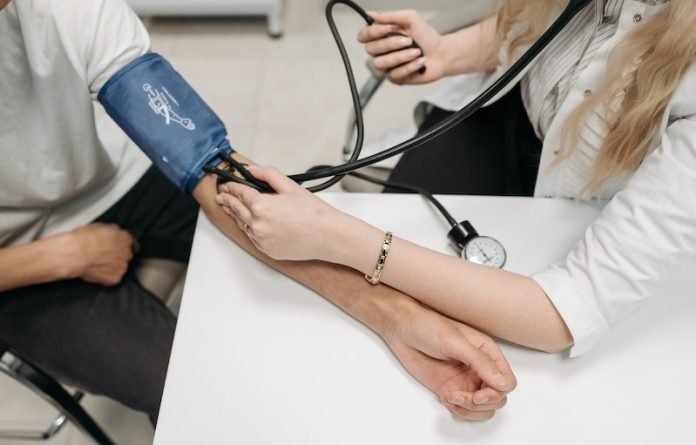
A recent study from the University of Maine found that taking B vitamins can help lower high blood pressure.
High blood pressure can lead to several health problems, including heart disease, stroke, and neurological diseases.
The study found that elevated levels of homocysteine, a compound that is involved in vitamin regulation, can increase the risk of high blood pressure.
Vitamin B6, B12, folate, and riboflavin (B2) help regulate homocysteine levels in the body.
Inadequate stores of these vitamins can cause high homocysteine levels, leading to small vessel vasoconstriction, which is a risk factor for high blood pressure.
The team reviewed the research literature and found that supplementing with sufficient nondietary-sourced vitamins B2, B6, folate, and B12 can safely lower blood pressure by as much as 6 to 13 mmHg.
Lowering homocysteine levels is relatively inexpensive because it is achieved by providing vitamin supplementation.
Drug-resistant hypertension, which affects approximately 12.8% of the world’s population, is defined as a failure to reach a target blood pressure of 140/90 mmHg using three classes of antihypertension medication.
The newer definition of hypertension, 130/80 mmHg, makes successful management even more difficult to achieve.
While recent literature supports the efficacy and safety of homocysteine-lowering in the treatment of hypertension, the validity of this generalization has been challenged.
Researchers argue that there is a need to update laboratory values for normal homocysteine and to determine whether risk-protective values should be even lower.
It’s important to note that vitamin treatment should be conducted under the direction of a physician or qualified healthcare provider, and should not replace prescribed medication.
How to reduce high blood pressure
High blood pressure, also known as hypertension, can be managed and reduced through various lifestyle changes and medical treatments. Here are some ways to reduce high blood pressure:
Maintain a healthy weight: Being overweight or obese can increase the risk of developing high blood pressure. Maintaining a healthy weight can help lower blood pressure.
Exercise regularly: Regular physical activity can help lower blood pressure. Aim for at least 150 minutes of moderate-intensity exercise or 75 minutes of vigorous-intensity exercise per week.
Eat a healthy diet: Eating a diet that is low in sodium, saturated fats, and added sugars and rich in fruits, vegetables, whole grains, and lean protein can help lower blood pressure.
Limit alcohol intake: Drinking too much alcohol can raise blood pressure. Men should have no more than two drinks per day, and women should have no more than one drink per day.
Quit smoking: Smoking can raise blood pressure and increase the risk of heart disease. Quitting smoking can help lower blood pressure and reduce the risk of other health problems.
Manage stress: Chronic stress can contribute to high blood pressure. Finding healthy ways to manage stress, such as meditation, deep breathing, or yoga, can help reduce blood pressure.
Take medication as prescribed: If lifestyle changes alone are not enough to lower blood pressure, medication may be needed. Take medication as prescribed by a healthcare provider and attend regular check-ups to monitor blood pressure.
It’s important to consult a healthcare provider for an individualized plan to manage and reduce high blood pressure.
If you care about blood pressure, please read studies about unhealthy habits that could increase high blood pressure risk, and Vitamin B can help reduce drug-resistant high blood pressure.
For more information about blood pressure, please see recent studies that early time-restricted eating could help improve blood pressure, and results showing Marijuana may strongly increase death risk in high blood pressure.
The research was published in the American Journal of Hypertension and conducted by Merrill Elias et al.
Copyright © 2023 Knowridge Science Report. All rights reserved.



